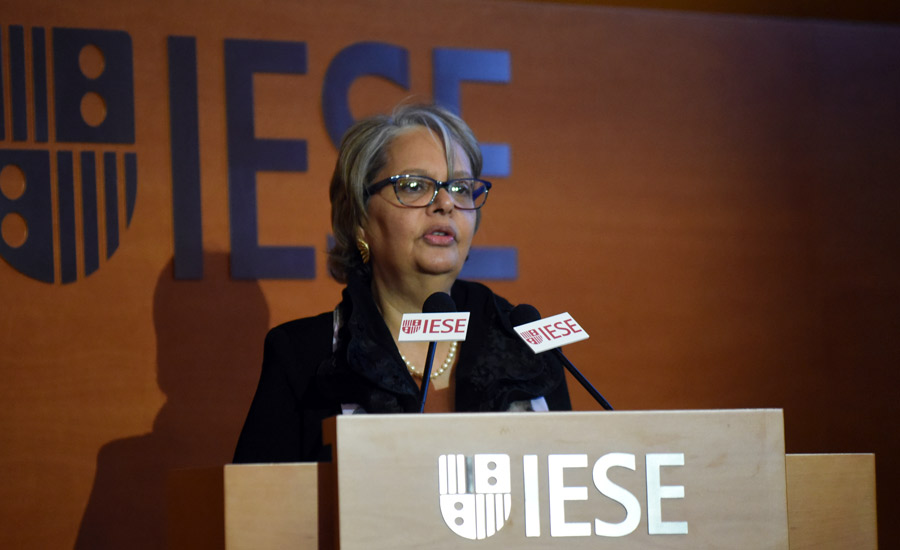
The IMF recently tapped global growth projections down from 3.6 to 3.2 percent. And while the figures remain stronger than 2015, longer-term prospects will be threatened by strong economic headwinds.
Responding to this “new normal,” says Dean Jordi Canals, is contingent on adopting a “longer-term horizon:” one that will foster growth.
Canals’ remarks came at the opening of the annual International Advisory Board panel discussions at IESE in Barcelona. Joining him were distinguished board members from public administration, banking and business who each shared their expert perspective on the global economic outlook.
Tapping Into the Parity Opportunity
Patricia Francis, former chair of public sector transformation with the Government of Jamaica, kicked off the discussion highlighting the $28 trillion opportunity that gender parity represents globally. Francis, who was recently appointed interim lead coordinator of the United Nations secretary general's panel on Women's Economic Empowerment, said that the financial and digital inclusion of women could be the “fillip to get sustainability goals going.”
“Between 1990 and 2010 we saw a 28 percent reduction in poverty as a result of greater parity. We need to address challenges like the care economy, the wage gap, economic exclusion to tap into the $28 trillion opportunity that women represent in the global economy. Parity is everybody’s business.”
Chairman of Kerry Logistics and Singapore´s former Trade and Industry Minister, George Yeo agreed. He cited the example of Bangladesh, where “organic vitality driven largely by women is seeing the economy perform better than India.”
Yeo believes that this transformation could well spread across the developing world, driven in part by another game changer: digitization.
Digitization Versus Imbalance
“Access to the Internet is driving enormous transformation at an atomic level. Put a smartphone in the hands of an oppressed women, child or low-caste Indian and the world opens up before them.”
Leveraging digitization to enable contribution across underserved portions of the global community has to be squared, however, against what Yeo describes as “imbalances” in the power and political opposition to change.”
“Transformation means change and it means pain. Governments, with their four-to-five-year life cycles, are at odds to avoid structural reform because it causes pain. But the results – negative interest rates, ‘free money’ – do not promote fairness. They drive inequality and creating problems for the future.”
A Changing Epoque Calls for a Longer-Term View
Looking into the future and the longer-term outlook for the global economy too, was Michel Camdessus, former head of the IMF and governor of Banque de France. The IMF forecast is not “worrying,” said Camdessus. Downside risk, and a “myopic view of the economy” is creating not only a “new normal, but a new mediocre.”
“We have projected growth figures to 2050 of 3.3 percent – rising to 4 percent and 5 percent in Africa,” said Camdessus. However short-term tactics, a failure to successfully rebalance China, emerging non-economic risks might derail growth at any point. These must be addressed, he said, by “multi-lateral response” that will call for “enormous effort.”
“We are changing epoque. And that calls for a long-term view. It means looking into the future. It means reform, it means fighting inequality and it means creating opportunities for women. The markets know this and this is why we are seeing volatility. We must not allow this to become a self-fulfilling prophecy.”
Driving Growth in Emerging Markets
Adopting the long-term horizon was a view shared by a second panel of board members from the world of business.
The keys to driving growth in emerging markets were long-term strategy and an ability to remain flexible, said Ibukun Awosika, chairwoman of the First Bank of Nigeria. That and a “major need to stay close to the local market. And it’s critical to partner with local companies that share your values, regardless of size or reach. You want to associate your brand with another that reflects your corporate culture.”
This was a view shared by Andrea Christenson, member of the advisory at Cementos Molins. “We look to emerging markets for labor supply chain, and working with local partners in management is the key.”
Ermenegildo Zegna, CEO of Zegna Italy stressed the importance of changing tack in a global economy prone to transformation. “We have had to rethink our business model. Digitization is driving change. In China we are seeing 80 percent of sales via mobile.
The key is flexibility and cleaving to the knowledge that in tough times, good companies come out stronger.”
“If you want high returns have to face up high volatility, political, digital and cyclical challenges,” said Francesco Vanni d'Archirafi, CEO of Citi Holdings.
“This requires a long term perspective. Adopting a longer-term view in emerging, you will probably see even higher returns than in developed markets.”
Hans Ulricht Maerki, former CEO of IBM and board member at Swiss Re, agreed and called for renewed optimism. “Emerging markets are high growth markets. Global growth of 3.2 percent and Chinese growth at 6 percent remains a fantastic opportunity.”
Vanni agreed and urged MBAs in the audience to seize opportunity: “Exploit every resource available to you, from learning in a great school like IESE, to being flexible. And keep your outlook long term.”